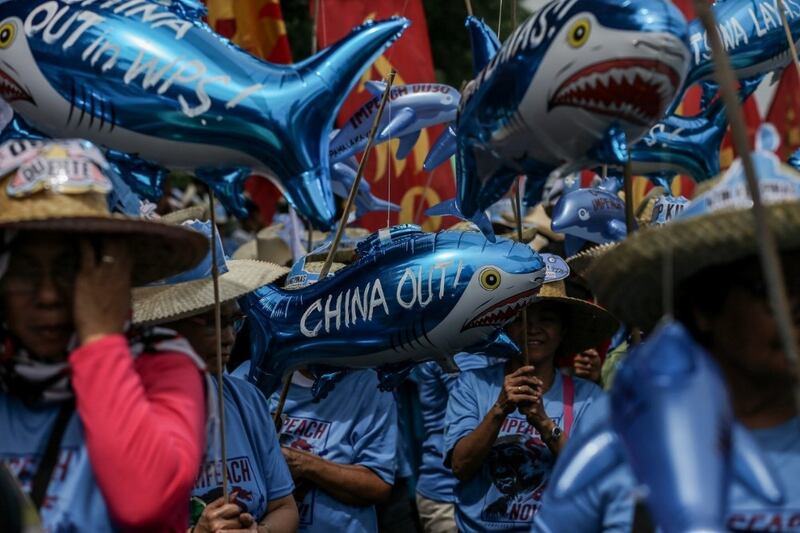The United States on Monday announced a tougher stance against China’s sweeping claims in the South China Sea, declaring them illegal and accusing Beijing of treating the disputed waters as a “maritime empire.”
In a statement, Secretary of State Mike Pompeo said there were “no legal grounds” for China’s expansive maritime claims. He formally aligned the U.S. position with the legal outcome of a key 2016 international court ruling between the Philippines and China.
“The world will not allow Beijing to treat the South China Sea as its maritime empire,” Pompeo said. “America stands with our Southeast Asian allies and partners in protecting their sovereign rights to offshore resources, consistent with their rights and obligations under international law.”
According to the State Department, the U.S. now regards China’s claim over rocks and reefs in the Spratly Islands, in the southern part of the South China Sea, as unlawful, and its maritime claims based off alleged ownership of those features similarly in violation of international law.
The statement specifically cited Beijing’s insistence on holding economic rights to waters around Scarborough Reef, Mischief Reef and Second Thomas Shoal, all of which are claimed by the Philippines.
The U.S. also rejected Chinese claims to Vanguard Bank off Vietnam’s southern coast, the Luconia and James Shoals which sit in Malaysia’s exclusive economic zone, and the waters off the coast of Brunei and Indonesia’s Natuna islands, the statement said.
“This is a major departure from traditional U.S. policy in the South China Sea. Prior to today’s announcement, Washington opposed Beijing’s excessive claims over wide swaths of the South China Sea, but officially did not take a position on the individual claims themselves,” said Derek Grossman, senior defense analyst at RAND Corp., a U.S. think tank.
Mixed reactions?
Previously, the U.S. had avoided taking sides on territorial disputes in the South China Sea, although it repeatedly called for freedom of navigation and overflight in the strategic maritime region.
While the U.S. never accepted the so-called "nine-dash-line" China set as its maritime boundary in 2009, Washington had not explicitly cited international law when it came to other types of claims, including Beijing's interpretation of what counts as islands in the South China Sea and their ability to generate exclusive economic zones for the sake of resource rights.
Greg Poling, senior fellow for Southeast Asia at the Washington, D.C.-based Center for Strategic and International Studies, said the statement clearly aligned the U.S. with the outcome of the 2016 Permanent Court of Arbitration award that ultimately struck down many of China's claims to the South China Sea, after the Philippines brought the case to court.
“Washington backed the process of the 2016 arbitral award but never clearly endorsed its substance. Now it has,” he said. “And so that means that it will not just decry Chinese activities in Southeast Asian waters as escalatory or dangerous, but can clearly say they’re illegal.”
The announcement of the new U.S. position comes as China continues to pressure Southeast Asian nations out of exploring for resources within their waters, through deployment of coastguard vessels, including at the Vanguard Bank, where it was involved in a months-long standoff with Vietnam last year and appears to be gearing up for another this year.

Pompeo’s tough statement followed one by his Philippine counterpart to mark the fourth anniversary of the 2016 arbitral ruling that has never been acknowledged by China, which boycotted the proceedings.
“The arbitral tribunal’s award of 12 July 2016 represents a victory, not just for the Philippines, but for the entire community of consistently law-abiding nations,” Foreign Secretary Teodoro Locsin said on Sunday, calling on China to comply with ruling.
“The Philippines, as law-abiding, peace-loving and responsible member of the international community, reaffirms on this occasion its adherence to the award and its enforcement without any possibility of compromise or change,” Locsin said.
The Philippine government has recently taken a more critical stance toward Beijing. But a Manila-based analyst called Locsin’s statement a calculated move to register the country’s interest in a ruling it has never moved to enforce under President Rodrigo Duterte.
“The Philippine government simply doesn’t walk its talk,” said Jose Antonio Custodio, a military historian and a political analyst at the Institute of Policy, Strategy and Development Studies. “In other words, he is Beijing’s surrogate,” he said of Duterte.
“The Philippines is not enforcing its maritime entitlements in the area and in fact is hesitant to even participate in multilateral maritime exercises there,” Custodio told BenarNews. “That is because of the strong influence of China on the Duterte administration.”
Locsin’s predecessor, Albert del Rosario, said that Duterte had decided to “shelve” the award “to pursue his full expectation of loans and investments from Beijing, which did not materialize.”
The U.S. decision to side with Southeast Asian nations on the South China Sea issue is likely to worsen U.S.-China relations, and get mixed responses from the countries involved, according to Grossman, the RAND analyst.
“Some countries, like Vietnam and the Philippines, are very likely to be happy with the U.S. move because they have been looking for support. But others, such as Malaysia and perhaps Indonesia … may not be as pleased. Only time will tell,” he said.
